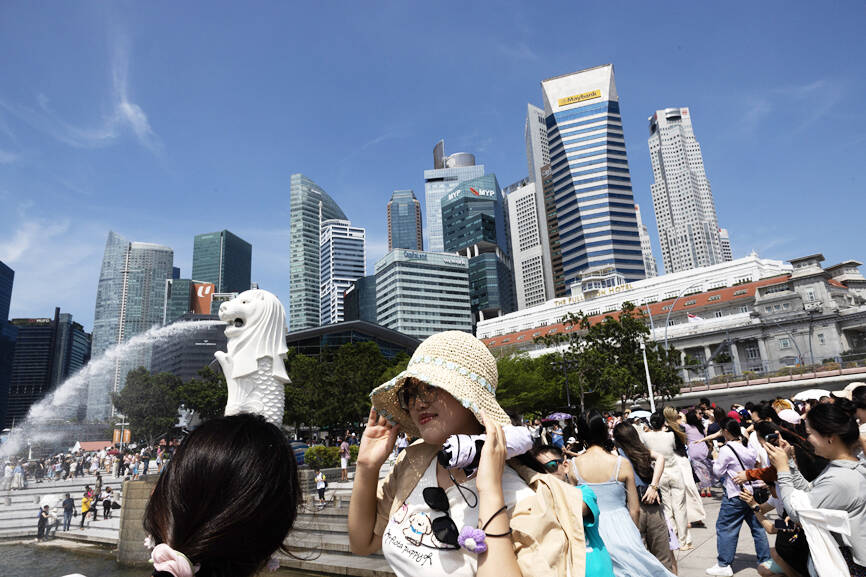Singapore’s electronics shipments grew the most since 2010, fueled by overseas sales of ICs and disk media products, as a global technology boom is proving a boon to the city-state.
Electronics exports rose 35.1 percent last month from a year earlier, following a revised increase of 16.8 percent the previous month, data released yesterday by Enterprise Singapore showed.
That was the fastest growth since June 2010.

Photo: EPA-EFE
The robust performance of electronics is providing the momentum for Singapore to meet, if not surpass, its GDP forecast of growing at the upper half of its 1 percent to 3 percent projected band.
The city-state is home to some of the largest chip manufacturing plants in Southeast Asia. Singapore and the broader Southeast Asia region are benefiting as companies diversify their tech supply chains beyond Taiwan and China to reduce risks related to tensions between Washington and Beijing.
“There is market talk that China is front-loading chips in anticipation of potential trade tariffs from the US that are targeted at China,” Oversea-Chinese Banking Corp (華僑銀行) chief economist Selena Ling (林秀心) wrote in a note. “Many uncertainties remain due to the US-China confrontation.”
Global tech companies have announced billions of dollars of fresh investments in the region this year, encouraged by demand for new services such as generative artificial intelligence.
Still, trade-reliant Singapore has reason to be cautious as non-oil domestic exports were up 10.7 percent, below the 15 percent median forecast in a Bloomberg News survey.
Month-on-month, overseas sales declined by 4.7 percent, reversing the 12.2 percent expansion in July.

CAUTIOUS RECOVERY: While the manufacturing sector returned to growth amid the US-China trade truce, firms remain wary as uncertainty clouds the outlook, the CIER said The local manufacturing sector returned to expansion last month, as the official purchasing managers’ index (PMI) rose 2.1 points to 51.0, driven by a temporary easing in US-China trade tensions, the Chung-Hua Institution for Economic Research (CIER, 中華經濟研究院) said yesterday. The PMI gauges the health of the manufacturing industry, with readings above 50 indicating expansion and those below 50 signaling contraction. “Firms are not as pessimistic as they were in April, but they remain far from optimistic,” CIER president Lien Hsien-ming (連賢明) said at a news conference. The full impact of US tariff decisions is unlikely to become clear until later this month

With an approval rating of just two percent, Peruvian President Dina Boluarte might be the world’s most unpopular leader, according to pollsters. Protests greeted her rise to power 29 months ago, and have marked her entire term — joined by assorted scandals, investigations, controversies and a surge in gang violence. The 63-year-old is the target of a dozen probes, including for her alleged failure to declare gifts of luxury jewels and watches, a scandal inevitably dubbed “Rolexgate.” She is also under the microscope for a two-week undeclared absence for nose surgery — which she insists was medical, not cosmetic — and is

GROWING CONCERN: Some senior Trump administration officials opposed the UAE expansion over fears that another TSMC project could jeopardize its US investment Taiwan Semiconductor Manufacturing Co (TSMC, 台積電) is evaluating building an advanced production facility in the United Arab Emirates (UAE) and has discussed the possibility with officials in US President Donald Trump’s administration, people familiar with the matter said, in a potentially major bet on the Middle East that would only come to fruition with Washington’s approval. The company has had multiple meetings in the past few months with US Special Envoy to the Middle East Steve Witkoff and officials from MGX, an influential investment vehicle overseen by the UAE president’s brother, the people said. The conversations are a continuation of talks that

CHIP DUTIES: TSMC said it voiced its concerns to Washington about tariffs, telling the US commerce department that it wants ‘fair treatment’ to protect its competitiveness Taiwan Semiconductor Manufacturing Co (TSMC, 台積電) yesterday reiterated robust business prospects for this year as strong artificial intelligence (AI) chip demand from Nvidia Corp and other customers would absorb the impacts of US tariffs. “The impact of tariffs would be indirect, as the custom tax is the importers’ responsibility, not the exporters,” TSMC chairman and chief executive officer C.C. Wei (魏哲家) said at the chipmaker’s annual shareholders’ meeting in Hsinchu City. TSMC’s business could be affected if people become reluctant to buy electronics due to inflated prices, Wei said. In addition, the chipmaker has voiced its concern to the US Department of Commerce